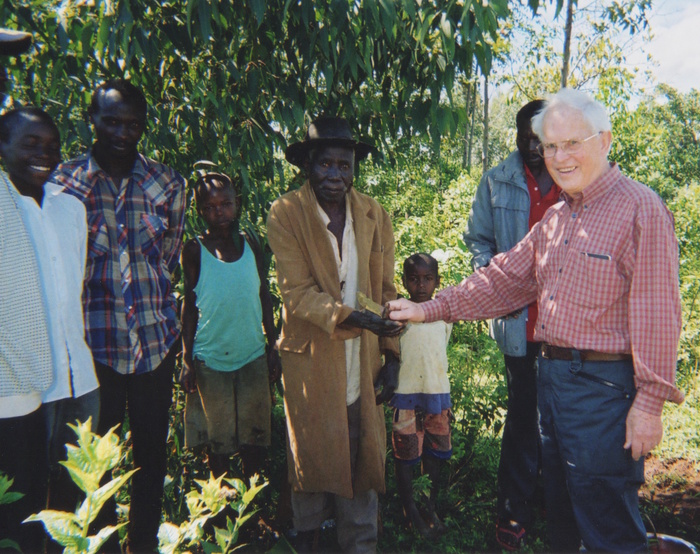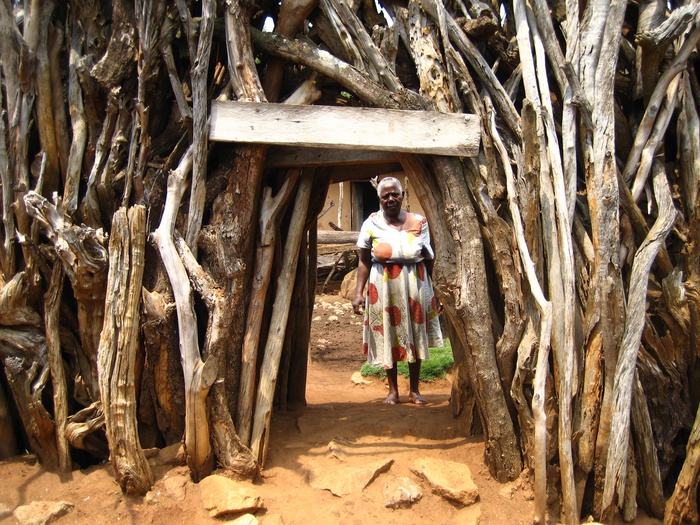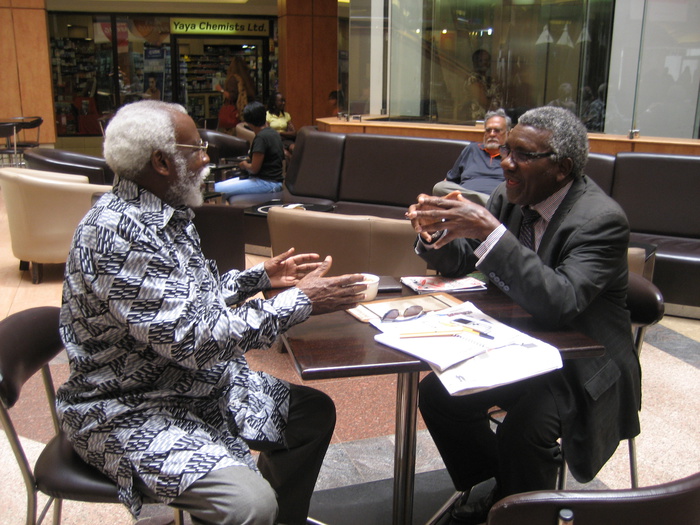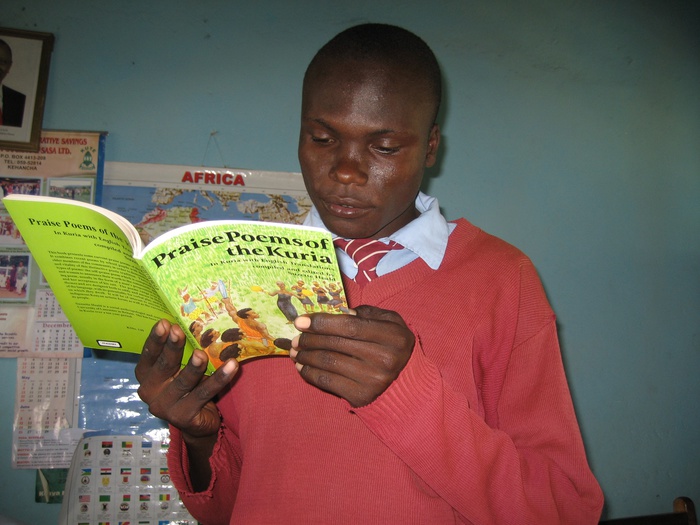History
Malcolm Ruel founded the Trust in 1991 as a measure of the gratitude and affection he felt for the Kuria with whom he had done anthropological research extending back to the 1950s. He named it to honour two influential men, Chacha Omaahe and Magige oTatwa. Both were progressive leaders, Chacha Omaahe in the Pentecostal movement and Magige oTatwa as Government chief of the AbaRenchoka. In 2016, we visited the home of Chacha Omaahe in Nyabasi and met his widow (pictured below at the gate to her traditional kraal). Omaahe had been an autodidact, widely versed and widely linked through the Pentecostal movement. In the main house we saw his library, a rarity in Kuria where houses rarely have a single book, as well as many photographs of him and his visitors, some from far afield.


Ruel returned to Kuria in the late 1980s and made a series of visits over the next 15 years. The idea for the charity emerged in 1991 as a cooperative venture between UK and Kuria. Educational standards in Kuria at that time were very low, with few children attending school for more than a few years in primary. Concerned to raise standards and for the district to progress, he was joined in the endeavour by some leading figures in the district.
Seba and Chacha in Nairobi in 2014
 Two key people were Seba Magoiga and Chacha Nyaigotti Chacha. Both now live in Nairobi where Chacha is Professor of Linguistics at the American University. Seba, who set up the Gosi Cultural Centre to preserve Kuria cultural artefacts, was one of the first three trustees of the UK Trust. Together with Chacha and other friends they also set up our partner organisation, Tatwa Omaahe Welfare Society (TOWS)in Kenya.
Two key people were Seba Magoiga and Chacha Nyaigotti Chacha. Both now live in Nairobi where Chacha is Professor of Linguistics at the American University. Seba, who set up the Gosi Cultural Centre to preserve Kuria cultural artefacts, was one of the first three trustees of the UK Trust. Together with Chacha and other friends they also set up our partner organisation, Tatwa Omaahe Welfare Society (TOWS)in Kenya.
Directly helping individual students to attend secondary school was always the main objective of the Trust but it has also contributed to education in other ways. In the 1990s, we helped to build secondary schools and supply equipment. We were also involved in literacy projects. With Sammy Muniko and Ben Mwita oMagige, Ruel compiled and published the first Kuria/English Dictionary in 1996. This involved developing a new orthography for the language that was intuitive for KiKuria speakers, allowing them to write KiKuria and easy access to English vocabulary. English, then and now, was the medium of instruction in upper years of primary school and in secondary schools.
 The emphasis on culture and literacy was also taken up by Suzette Heald, who began anthropological research in Kuria in 1984. The Kuria have a vibrant tradition of praise poetry. In 1995, she ran a competition in the primary schools inviting students to submit poems. The best of these were were published in a book, Praise Poems of the Kuria in 1996, with the Kikuria text set beside English translations. The Trust distributed 1000 copies of this book to schools and students in Kuria. It remains popular among both adults and children. As with the Dictionary, the proceeds of the original sales went to TOWS.
The emphasis on culture and literacy was also taken up by Suzette Heald, who began anthropological research in Kuria in 1984. The Kuria have a vibrant tradition of praise poetry. In 1995, she ran a competition in the primary schools inviting students to submit poems. The best of these were were published in a book, Praise Poems of the Kuria in 1996, with the Kikuria text set beside English translations. The Trust distributed 1000 copies of this book to schools and students in Kuria. It remains popular among both adults and children. As with the Dictionary, the proceeds of the original sales went to TOWS.
In Britain, over two decades, Ruel set about raising funds for the charity and built up a considerable investment fund from friends and from the students and staff of Clare College, Cambridge, who responded with enthusiasm. One of our studentships every year is named the 'Lady Clare', and is awarded to the girl with the highest marks in the Kenya Certificate of Primary Education among our applicants.
Malcolm Ruel’s research in Kuria has been archived by the Bristol Museum. This site is still under construction. More details of access will be posted as these become available.
http://museums.bristol.gov.uk/details.php?irn=311299


Ruel returned to Kuria in the late 1980s and made a series of visits over the next 15 years. The idea for the charity emerged in 1991 as a cooperative venture between UK and Kuria. Educational standards in Kuria at that time were very low, with few children attending school for more than a few years in primary. Concerned to raise standards and for the district to progress, he was joined in the endeavour by some leading figures in the district.
Seba and Chacha in Nairobi in 2014
 Two key people were Seba Magoiga and Chacha Nyaigotti Chacha. Both now live in Nairobi where Chacha is Professor of Linguistics at the American University. Seba, who set up the Gosi Cultural Centre to preserve Kuria cultural artefacts, was one of the first three trustees of the UK Trust. Together with Chacha and other friends they also set up our partner organisation, Tatwa Omaahe Welfare Society (TOWS)in Kenya.
Two key people were Seba Magoiga and Chacha Nyaigotti Chacha. Both now live in Nairobi where Chacha is Professor of Linguistics at the American University. Seba, who set up the Gosi Cultural Centre to preserve Kuria cultural artefacts, was one of the first three trustees of the UK Trust. Together with Chacha and other friends they also set up our partner organisation, Tatwa Omaahe Welfare Society (TOWS)in Kenya. Directly helping individual students to attend secondary school was always the main objective of the Trust but it has also contributed to education in other ways. In the 1990s, we helped to build secondary schools and supply equipment. We were also involved in literacy projects. With Sammy Muniko and Ben Mwita oMagige, Ruel compiled and published the first Kuria/English Dictionary in 1996. This involved developing a new orthography for the language that was intuitive for KiKuria speakers, allowing them to write KiKuria and easy access to English vocabulary. English, then and now, was the medium of instruction in upper years of primary school and in secondary schools.
 The emphasis on culture and literacy was also taken up by Suzette Heald, who began anthropological research in Kuria in 1984. The Kuria have a vibrant tradition of praise poetry. In 1995, she ran a competition in the primary schools inviting students to submit poems. The best of these were were published in a book, Praise Poems of the Kuria in 1996, with the Kikuria text set beside English translations. The Trust distributed 1000 copies of this book to schools and students in Kuria. It remains popular among both adults and children. As with the Dictionary, the proceeds of the original sales went to TOWS.
The emphasis on culture and literacy was also taken up by Suzette Heald, who began anthropological research in Kuria in 1984. The Kuria have a vibrant tradition of praise poetry. In 1995, she ran a competition in the primary schools inviting students to submit poems. The best of these were were published in a book, Praise Poems of the Kuria in 1996, with the Kikuria text set beside English translations. The Trust distributed 1000 copies of this book to schools and students in Kuria. It remains popular among both adults and children. As with the Dictionary, the proceeds of the original sales went to TOWS. In Britain, over two decades, Ruel set about raising funds for the charity and built up a considerable investment fund from friends and from the students and staff of Clare College, Cambridge, who responded with enthusiasm. One of our studentships every year is named the 'Lady Clare', and is awarded to the girl with the highest marks in the Kenya Certificate of Primary Education among our applicants.
Malcolm Ruel’s research in Kuria has been archived by the Bristol Museum. This site is still under construction. More details of access will be posted as these become available.
http://museums.bristol.gov.uk/details.php?irn=311299